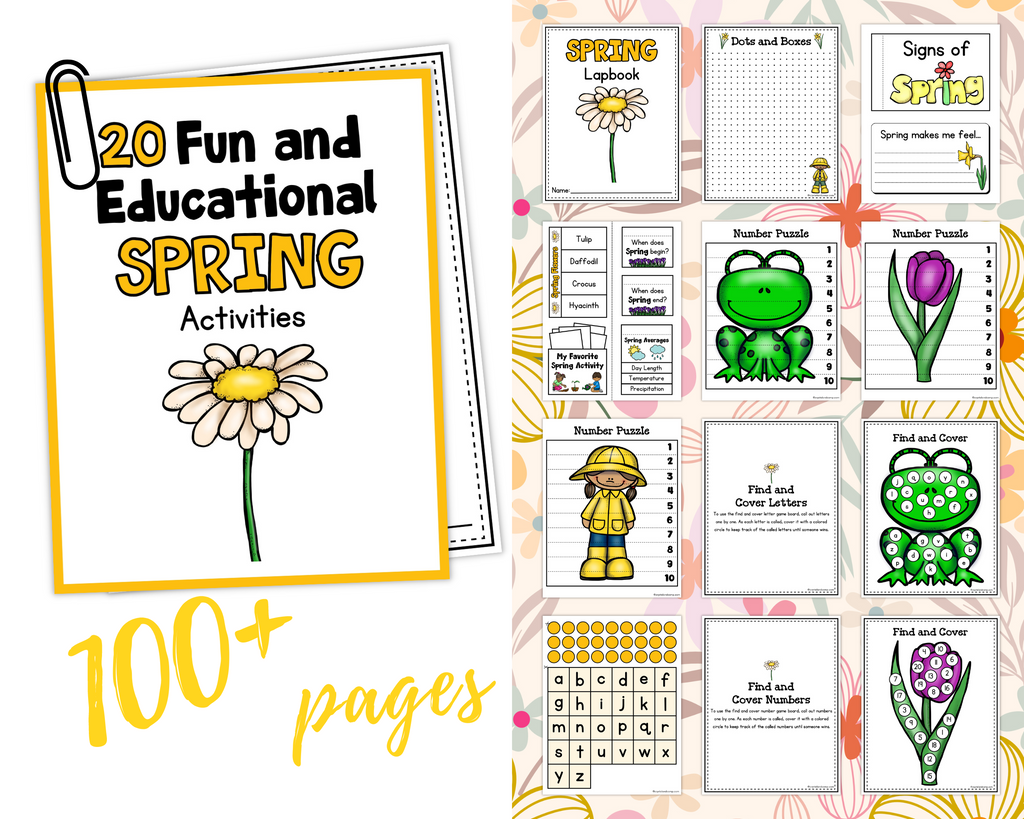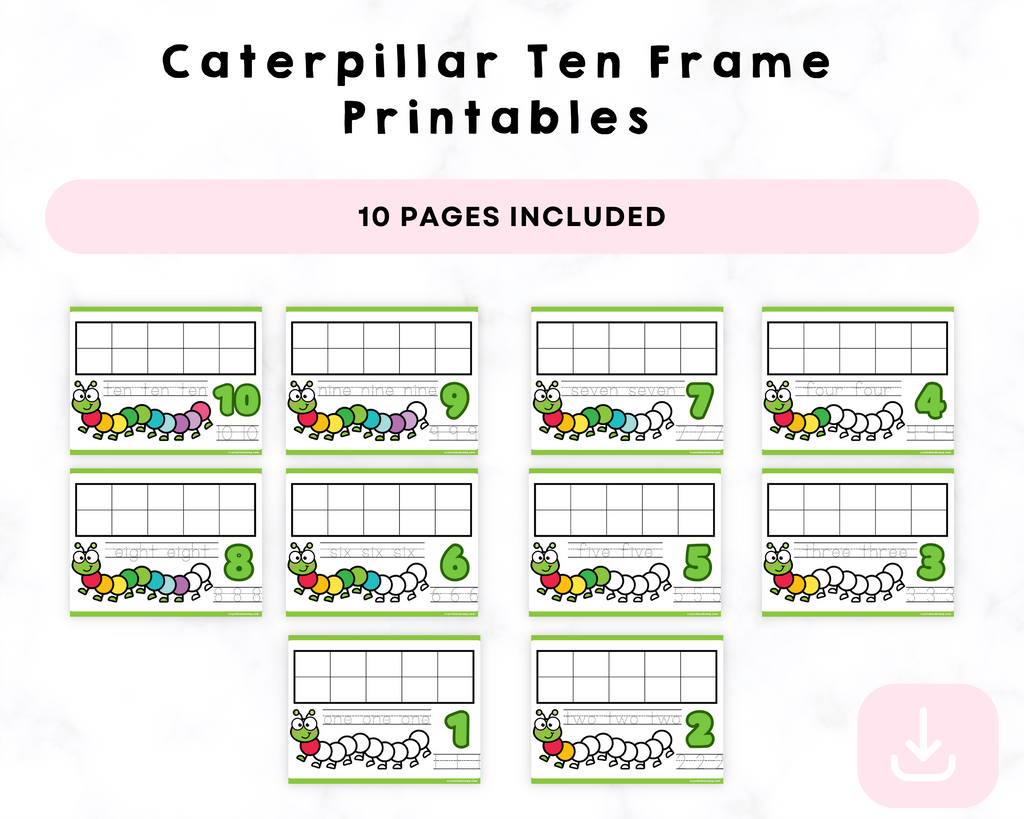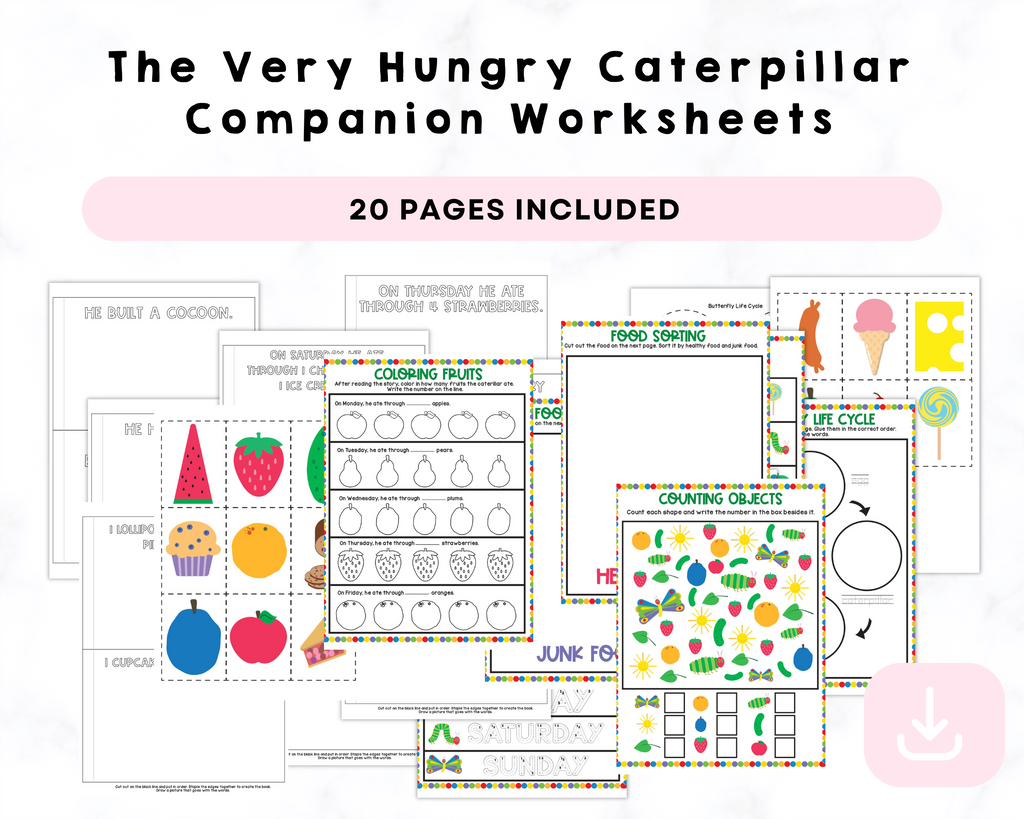Caterpillar Counting Printable Book
Spring is in the air! What a perfect time to celebrate numbers and counting with your preschooler than with these educational tools that make learning absolutely fun! This Caterpillar Counting Printable Book features colorful caterpillars that are segmented into different sections, each with a number printed on it. The child is then prompted to count the segments on the caterpillar and work their way up to the number 10!
Spring Preschool Printables are wonderful integrations of the season into teaching your preschooler!
Not only do caterpillar counting printable books teach basic counting skills, but they also provide a tactile element to learning. By manipulating and counting the segments on the caterpillar, children are able to physically interact with the numbers and develop a deeper understanding of numerical concepts. Additionally, the bright colors and cute illustrations of the caterpillars make these books visually appealing for children, encouraging them to stay engaged and interested in the learning process.
20 Spring Mega Activities Printable Pack
While you are here, check out our caterpillar line tracing pages for your Spring lesson plan.
Spring Counting Activities
Our downloads are made with curious preschoolers in mind, combining education and fun. These printables emphasize all of the earliest learning skills for preschoolers and also are adaptable to any learning environment from classroom to homeschool preschool! Print them up right at home in minutes!
- Butterfly Counting Printables
- Butterfly Math Printables
- Flower Counting Printables
- Frog Math Printables
What Is The Purpose of Learning Math Concepts In Early Learning?
Learning math concepts in preschool is an essential part of the early education system. The purpose of learning math concepts in preschool is to provide a strong foundation for children’s future learning and success. Math concepts provide a framework for understanding, problem-solving, and critical thinking. Through math concepts, preschoolers learn how to count, recognize and write numbers, identify shapes and sizes, compare objects, and make simple calculations.
Math concepts also foster creativity and imagination, as preschoolers learn to explore and make sense of the world around them. Furthermore, early exposure to math concepts helps children build confidence in their abilities and develop a positive attitude towards learning. All of these benefits are essential for children to reach their full potential and become lifelong learners.
Scroll To The Bottom To Download!
Understanding Number Sense in Preschool
Fine motor skills are crucial for preschool-aged children as they prepare for the next stages of their learning journey. These skills involve the use of small muscles in the hands, fingers, and wrists, and they play a vital role in daily activities such as writing, drawing, buttoning clothes, and using utensils. Fine motor skills are essential for the development of hand-eye coordination, spatial awareness, and concentration, all of which are critical for academic success.
Preschool is a critical time for children to develop fine motor skills as it lays the foundation for later academic success. Children who have strong fine motor skills are better equipped to handle the demands of schoolwork and are more likely to succeed academically. They are also more confident in their abilities and are better able to express themselves creatively.
Zicolu Kids Scissors Set of 3 pack, Safety Children Scissors, Craft Scissors with Blunt Tip Floral Print Blade and Soft Grip, Great for Home and School, Blue/Purple/Yellow OidoZac 11-in-1 Laminator with 36 Laminating Sheets, 13
OidoZac 11-in-1 Laminator with 36 Laminating Sheets, 13 Brother MFC-J1010DW Wireless Color Inkjet All-in-One Printer with Mobile Device and Duplex Printing, Refresh Subscription and Amazon Dash Replenishment Ready
Brother MFC-J1010DW Wireless Color Inkjet All-in-One Printer with Mobile Device and Duplex Printing, Refresh Subscription and Amazon Dash Replenishment Ready Crayola Broad Line Markers (12 Count), Washable Markers for Kids, Assorted, Great for Classrooms & School Supplies, Ages 3+
Crayola Broad Line Markers (12 Count), Washable Markers for Kids, Assorted, Great for Classrooms & School Supplies, Ages 3+ Ticonderoga Wood-Cased Pencils, Unsharpened, 2 HB Soft, Yellow, 24 Count
Ticonderoga Wood-Cased Pencils, Unsharpened, 2 HB Soft, Yellow, 24 Count Stylo Pack of 6 Pencil Grips for Kids Handwriting Perfect Pencil Holders for Kids Home Schooling and Preschool Writing Tools for Kids Assorted Pen Grips Christmas Gifts (Multicolored)
Stylo Pack of 6 Pencil Grips for Kids Handwriting Perfect Pencil Holders for Kids Home Schooling and Preschool Writing Tools for Kids Assorted Pen Grips Christmas Gifts (Multicolored)
Preschool Math Activities
Fine motor activities are essential to preschool learning. These ideas are truly engaging for the early learners and versatile enough where you can incorporate them easily from home!
- Caterpillar Math Printables
- Math Car Race Game
- Low Prep Bottle Cap Math Game For Preschoolers
- Bug Color By Number Printables
- Egg and Nest Math Worksheets
Benefits of Teaching Problem Solving In Preschool
Problem solving skills are essential for children to develop from an early age, especially in mathematics. Teaching problem solving to preschoolers is beneficial as it helps them develop critical thinking skills and promotes their cognitive development. Preschoolers are curious by nature and enjoy exploring their environment, which provides an opportunity for them to develop their problem solving skills. By presenting children with mathematics problems, they are encouraged to think creatively and come up with multiple possible solutions.
Another benefit of teaching problem solving to preschoolers is that it helps develop their confidence and self-esteem. When children are able to find solutions to problems on their own, they feel empowered and accomplished. This motivates them to continue learning and exploring their environment. Moreover, problem solving skills are transferable; children who are confident in solving math problems are more likely to approach other challenges with the same level of confidence. This translates to better academic performance and success later in life.
Looking for more fine motor work? These themed pattern block pages are a lot of fun!
Caterpillar Ten Frame Printables
How Patterns Build Numeracy In Preschool Learning
One way to make learning numbers fun and engaging for preschoolers is through the use of patterns. Patterns are a sequence of events, shapes, or objects that follow a particular rule. They repeat themselves and create a sense of consistency that children can easily identify and recognize. When children learn patterns, they develop their numeracy skills by understanding the relationship between numbers, shapes, and objects.
Patterns are everywhere around us. From the stripes on a zebra to the leaves on a tree, patterns are all around us and can be used to teach numeracy to preschool children. By introducing patterns to preschoolers, children learn to compare and contrast different shapes and objects, which helps them recognize similarities and differences. This skill is essential in helping children understand numbers, as they learn to sort and classify objects based on their size, shape, and color. Additionally, patterns can help preschoolers develop problem-solving skills as they learn to identify and complete patterns based on different rules. Learning to recognize and complete patterns in a fun and engaging way is a great way to help preschoolers build their numeracy skills.
The Very Hungry Caterpillar Companion Worksheets Printable
Benefits of Learning Manipulatives For Early Learners
Manipulatives are hands-on learning tools that are designed to help young children learn critical concepts. These tools can be anything from counting blocks and tangrams to pattern blocks and geoboards. The benefits of learning manipulatives for early learners are many. First and foremost, manipulatives allow young children to understand abstract concepts like numbers and shapes in concrete ways. Children can physically hold and manipulate the objects, which helps them develop a deep understanding of these concepts.
Picking up and manipulating small objects like pattern blocks and counting bears helps young children develop the small muscles in their hands and fingers that are necessary for tasks like writing and drawing. Moreover, manipulatives engage young children in active learning, which is far more beneficial than passive learning. When children use manipulatives, they are actively involved in the learning process, which helps them retain what they have learned much more effectively than if they were simply watching or listening to someone else.
If the download box is not populating below, click the following link to grab the counting printable book.
















